第十八届东方心脏病学会议
中国
上海
今日仰望星空
明日逐梦星辰
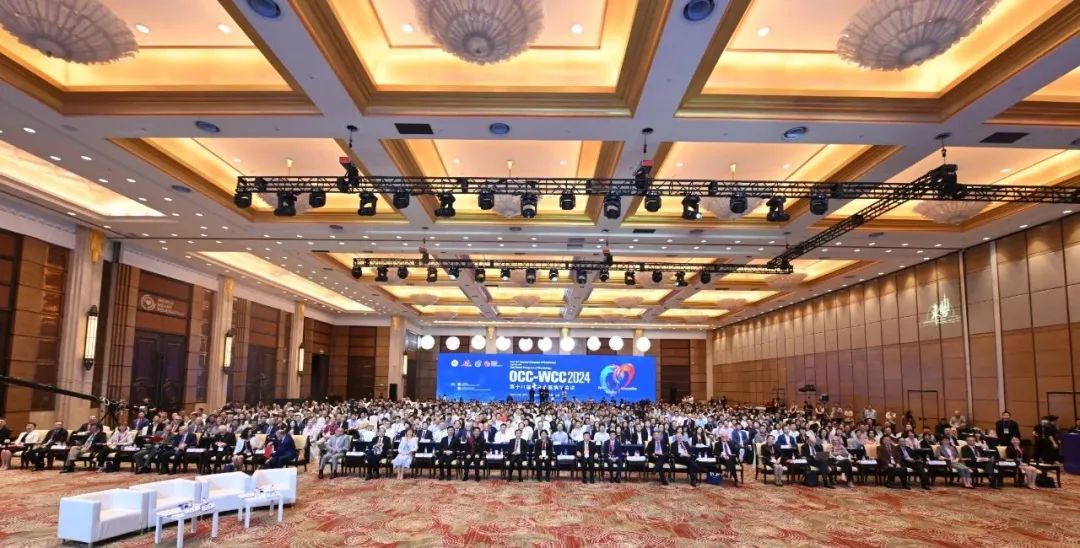
当人类抬头仰望星空的那一刻起,离他们解开宇宙的奥秘就不远了。
——《三体》
人类每前进一步都从想象与探索开始,当医学家将目光投向元宇宙星空的那一刻起,实现医学元宇宙的愿景便不再遥不可及。
2024年6月28日上午8点,来自全球的心脏病学巨擘们齐聚上海国际会议中心,共同见证第十八届东方心脏病学会议(OCC 2024)和世界心脏病学大会(WCC 2024)开幕。
01
开幕序章:
今日仰望星空,明日逐梦星辰
伴随着星际穿越的主旋律,大会主席、复旦大学附属中山医院葛均波院士以《泛血管与元宇宙——今日仰望星空,明日逐梦星辰》为题,展望泛血管医学与元宇宙融合的未来,并与五位国际知名心脏病学专家现场讨论。

葛均波院士首先指出,当前,中国心血管疾病的发病率和死亡率仍然处在上升态势。而从全球范围来看,心血管疾病的防控形式依然严峻,或许我们应该突破学科边界,从更高层面重新审视心血管疾病、审视动脉粥样硬化。基于临床观察,葛均波院士于2015年与王拥军教授等一起在国内提出泛血管疾病的理念,期望能够从整体上对此类疾病进行防控、治疗与管理。如果只从单一的专科角度出发,无异于盲人摸象,对动脉粥样硬化或者泛血管疾病的认识会存在偏差。
泛血管疾病累及全身,如果要进行更加有效的干预与管理,需要更高效、精准的平台来连接患者与医生,而人工智能+元宇宙的构架无疑能够满足这一需求。葛均波院士形象生动地展示了一个真实病例,AI模型显示其发生肥厚型心肌病的概率高达0.95,后续检查也验证这一结论。对于该类模型的应用,葛均波院士邀请世界心脏联盟科学委员会主席、OCC-WCC学术主席Thomas Gaziano教授与美国心脏病学会副主席Christopher Kramer教授分享各自观点。
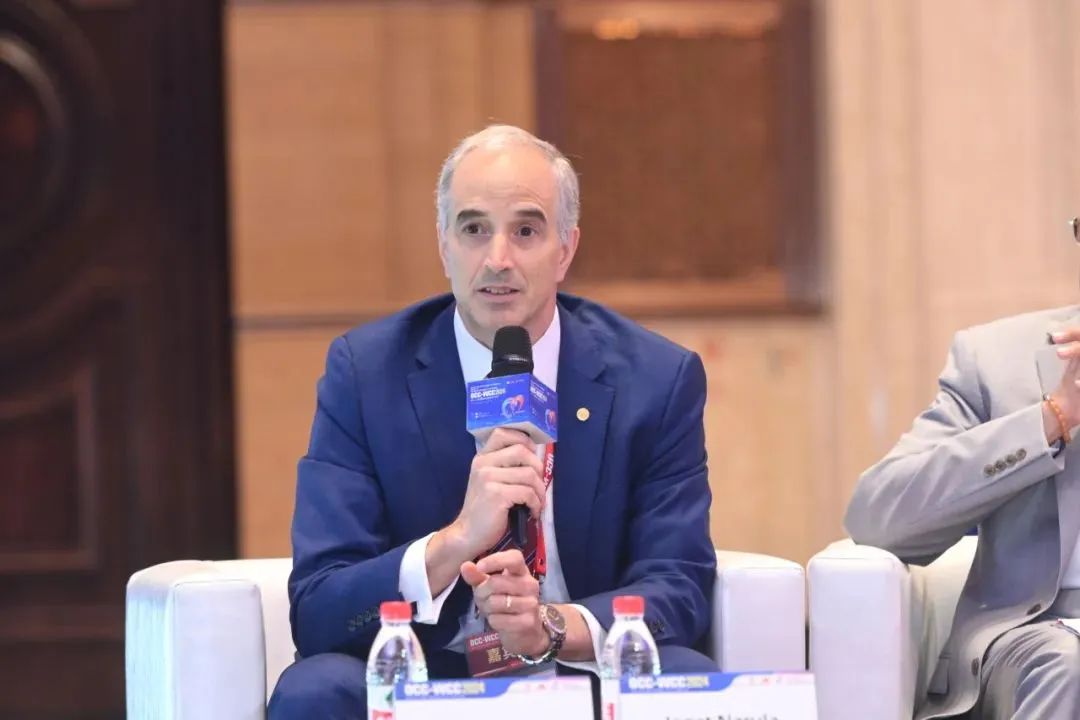
Thomas Gaziano教授认为,面对庞大的患者人数,心血管医师的数量相对不足,元宇宙能让优秀的医生服务更多患者。在元宇宙中,相互“连接”的理念让力量汇聚。今天他所佩戴的领带是心血管健康联盟(CCA)刚刚送给他的礼物,领带的英语单词为“tie”,同样有“连接”之意,正是这种相互连接、相互合作,让我们能够直面解决当前存在的问题。
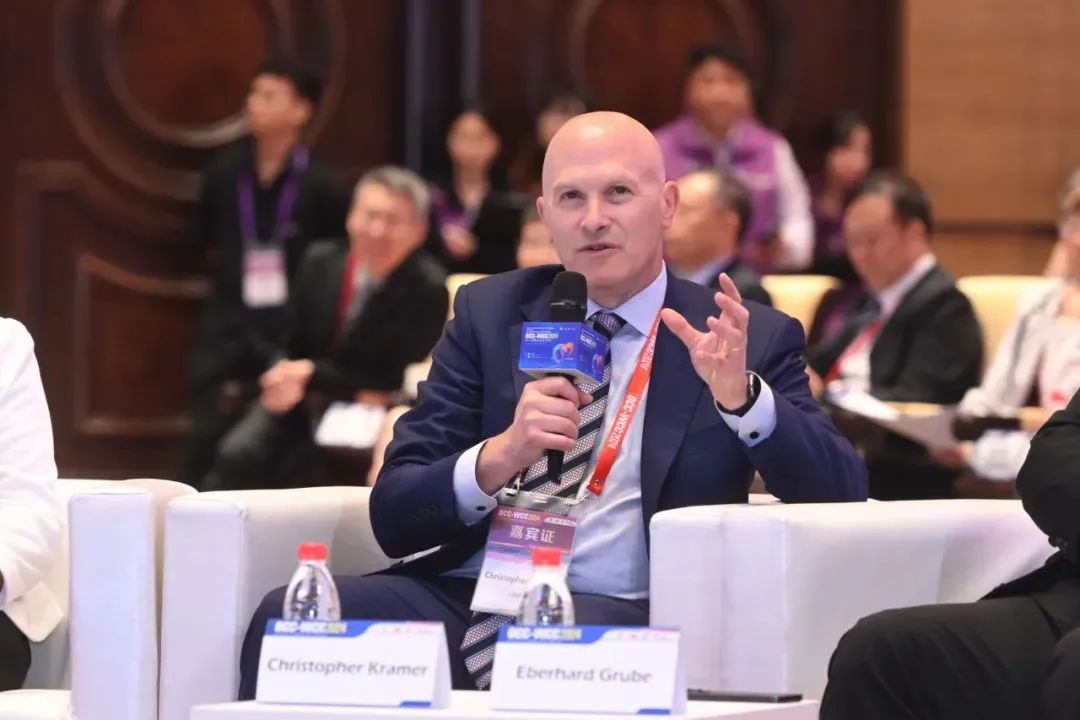
Christopher Kramer教授则指出,肥厚型心肌病当前诊断不足,大约只有1/6-1/5的患者得到诊断。AI技术的出现无疑大大提高了肥厚型心肌病的诊断效率和准确性,尤其是在心脏影像学方面的应用。Christopher Kramer教授介绍他们团队开发的一项技术,在不需要MRI造影剂的情况下结合AI技术识别心脏疤痕,为肥厚型心肌病的诊断提供新的契机。
葛均波院士在元宇宙中继续徜徉,介绍前不久全球首个光子CT在上海交通大学医学院附属瑞金医院启用,不仅能够测量冠脉狭窄的程度、评估冠脉斑块的性质,还能观察斑块有无炎症反应,对病变做出更加精准的评估。结合元宇宙的话,此类技术对医生诊疗疾病的方式会产生怎样的改变呢?
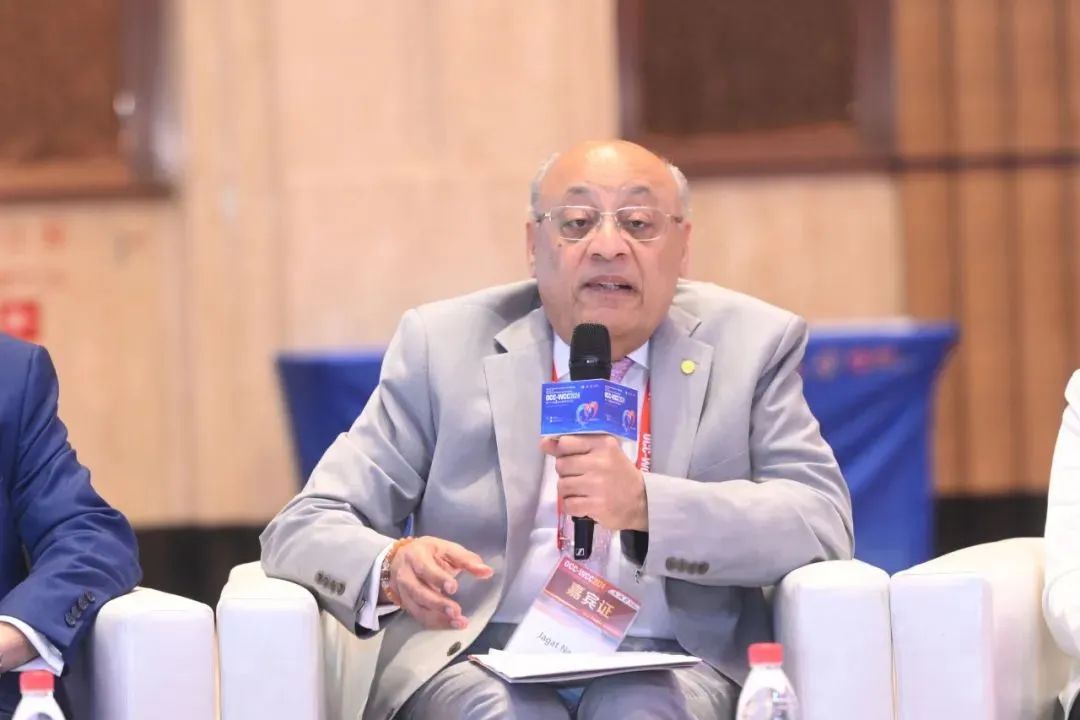
对此,世界心脏联盟候任主席Jagat Narula教授表示,对于疾病的诊断以及患者的管理需要更加精细。如果元宇宙能够提供更加详细的信息,或许我们可以精准地干预病变,让患者知道现在可以跑步还是走路,具体吃哪些健康食品,元宇宙具有巨大的潜力帮助我们完成这一目标。
3周前,葛均波院士运用国产介入手术机器人和5G技术,为远在5200公里以外的患者完成了PCI介入治疗。面对更加复杂的结构性心脏病介入治疗,元宇宙能否继续发挥理想的作用呢?

德国波恩大学医院心脏病创新介入中心Eberhard Grube教授回忆往事,他在与多年前就和葛均波院士深入讨论结构性心脏病介入治疗,当时投身这一领域的心血管医师还寥寥无几。今天,结构性心脏病介入治疗已经成为心血管领域的热点。但Eberhard Grube教授指出一个问题,选择介入治疗意味着疾病在早期阶段并未得到控制,或许元宇宙能够带来医学模式的改变;对于需要介入治疗的患者,元宇宙也能帮助医生判断患者预后。

泛血管疾病和元宇宙的基础理念和相关技术已经完整呈现,下一步葛均波院士实时展示在元宇宙中更加实际的应用场景!来自南京的一位年轻女性患者出现心慌、胸闷,根据患者的症状、智能家居提供的参数,当AI综合评估患者需要就医时,葛均波院士拿出最新款的AR+VR头戴式混合现实设备并进入虚拟诊室,远程连线为患者进行诊断。葛均波院士发出提问:元宇宙是否会为医疗模式带来根本性的改变?

美国心脏病学会前主席,世界心脏联盟理事Dipti Itchhaporia教授指出,尽管过去70年心血管病的诊疗技术、治疗药物取得了巨大进步,但在提供护理的方式或者说患者管理方面,几乎与70年前一致。元宇宙的出现能够让我们为更多患者提供高质量的护理和管理,对于偏远地区的可及性也更高。Dipti教授强调,这不仅仅是观念或者心态上的转变,而是一个颠覆性的过程,今天OCC-WCC 2024的开幕式,正体现出这种转变。正如葛均波院士所提出的泛血管疾病理念,是将病人看作一个整体,从整体上去预防、诊断、管理疾病。元宇宙无疑会将这一愿景逐步实现。葛均波院士联袂五位国际心脏病学专家一起呼吁,希望心血管医师积极拥抱未来,拥抱科技带来的获益,为患者提供更好的治疗与管理。
02
开幕致辞:十八年弹指一挥间
开幕序章之后,正是热情洋溢开幕仪式。
出席开幕式的嘉宾有:
上海市科学技术协会副主席、上海市医学会会长邬惊雷教授;
大会名誉主席,中国工程院院士,中华医学会心血管病学分会主任委员韩雅玲院士;
大会名誉主席,中国工程院院士,亚太超声心动图协会副主席张运院士;
大会名誉主席,中国科学院院士,上海市医学会副会长陈义汉院士;
大会名誉主席,中国科学院院士,浙江省医学会副会长王建安院士;
上海市医学会常务副会长谭鸣教授;
中华医学会心血管病学分会第九届委员会主任委员,北京大学第一医院霍勇教授;
中华医学会心血管病学分会候任主委,首都医科大学附属北京安贞医院马长生教授;
以及大会主席,中国科学院院士,中国医师协会心血管内科医师分会会长,上海市医学会副会长葛均波院士。
此次OCC与WCC同期召开
众多海外专家出席开幕式
包括世界心脏联盟现任主席Daniel Piñeiro教授;
世界心脏联盟候任主席Jagat Narula教授;
世界心脏联盟科学委员会主席,OCC-WCC学术主席Thomas Gaziano教授;
美国心脏病学会前主席,世界心脏联盟理事Dipti Itchhaporia教授;
美国心脏病学会前主席Richard Chazai教授;
美国心脏病学会主席Cathleen Dalton Biga教授;
美国心脏病学会副主席Christopher Kramer教授;
《欧洲心脏病杂志》主编Filippo Crea教授;
Circulation杂志主编Joseph Hill教授;
德国波恩大学医院心脏病创新介入中心Eberhard Grube教授;
澳大利亚皇家医学院院士,新加坡国家心脏中心林延龄教授;
美国华裔心脏学会创始主席,麻省医学中心无创心脏科姜楞教授。
此外,来自世界心脏联盟理事会成员以及各委员会委员,各国际组织国际学会/协会成员,中华医学会心血管病学分会常委、委员,上海市医学会心血管病分会委员等超过30个国家和地区的专家同道共同见证了精彩开幕时刻。
四海宾朋齐聚,携手开辟OCC新征程

葛均波院士代表大会组委会向所有远道而来的朋友们致欢迎辞。葛院士首先引用了孔子的名言:“有朋自远方来,不亦乐乎”。先贤的哲言跨越2500年的时光来到今天,即使用英语表达,和同道相聚的喜悦之情仍然和古人心灵相通。葛均波院士表示,今年OCC与WCC同期召开,在“开放、创新、合作”的理念下,OCC将以更开放的姿态、更创新的格局以及更广阔的合作机遇,与全球心血管同道为学科发展奉献高科技、高效能、高质量特征的新质生产力,为中国乃至全球的心脏健康做出更大成绩。

韩雅玲院士代表中华医学会心血管病学分会致辞。韩雅玲院士指出,我国心血管病患病率仍处于上升趋势,提升心血管疾病防治水平对于建设健康中国具有非常重要的作用。东方心脏病学会议在葛均波院士的精心组织下,以丰富多元的形式,围绕新技术、新理念、新进展、新设备充分展开讨论与交流。今年OCC与WCC同期举办,进一步增进了国内外学术交流,相信在所有心血管病专家的努力下,中国心血管病防治事业一定会取得更大进步。
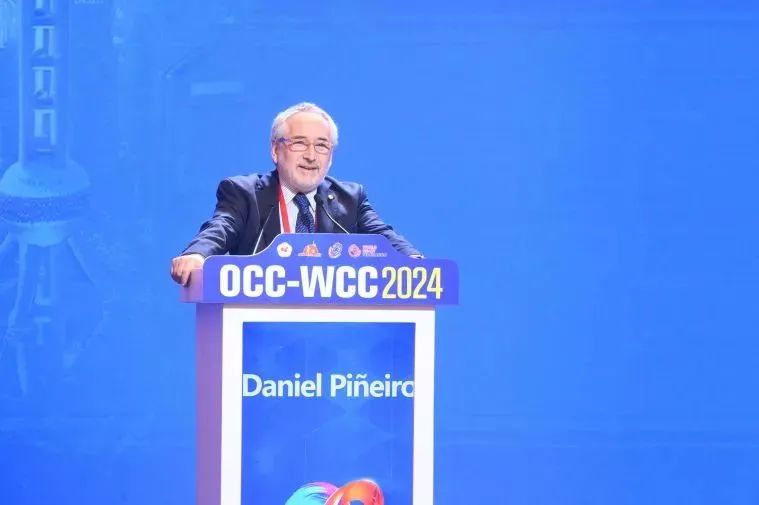
Daniel Piñeiro教授代表世界心脏联盟致辞。Daniel教授指出,世界心脏联盟联合了120多个国家和地区的心血管学会/协会,以期能够团结一致提高健康意识,改善心脏健康,减少心血管疾病带来的负担。心血管疾病与生活中的方方面面息息相关,我们不仅要找出这些关联和存在的问题,还要去积极寻找解决方案。今年WCC和OCC同期召开,正是一个成功合作的典范,希望在世界各地合作努力下,能够实现2030年将全球心血管疾病负担减少1/3的目标。
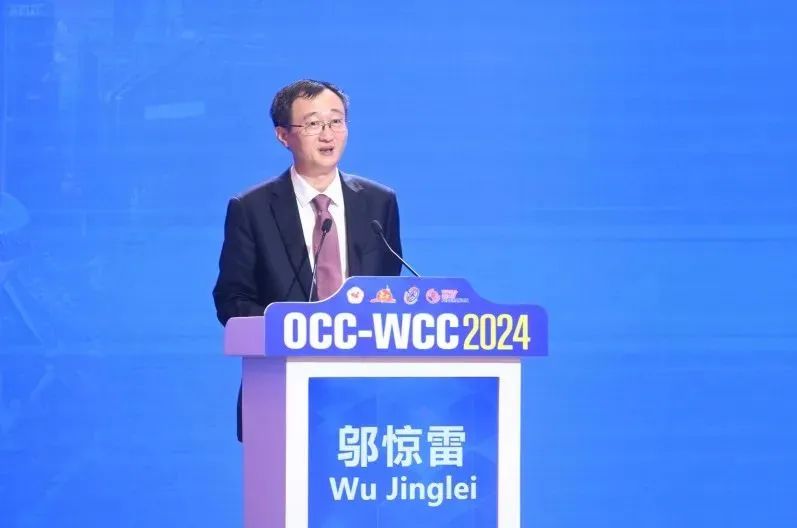
邬惊雷教授代表上海市医学会对世界各地心血管专家齐聚上海致以最热烈的欢迎。他表示,2007年葛均波院士发起首届东方心脏病学会议,也是上海市医学会“东方”系列品牌会议的开篇之作。东方会18年的发展不仅为“东方”系列品牌会议树立了标杆,更是孕育除了众多代表性的原创学术成果。心血管疾病的防控仍然是目前我们面临的挑战之一,广大心血管同仁肩负重要使命。期望东方会继续深化与全球学术界的互动交流,共同打造心血管病防治新高地。
03
主题演讲:新进展与新思考

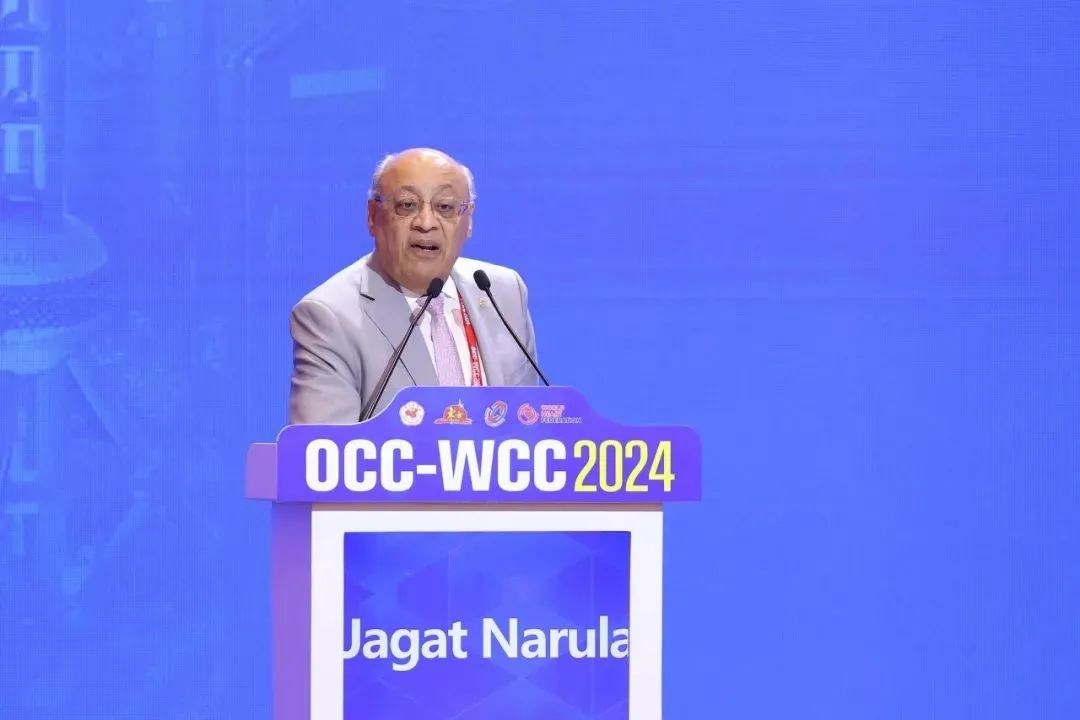

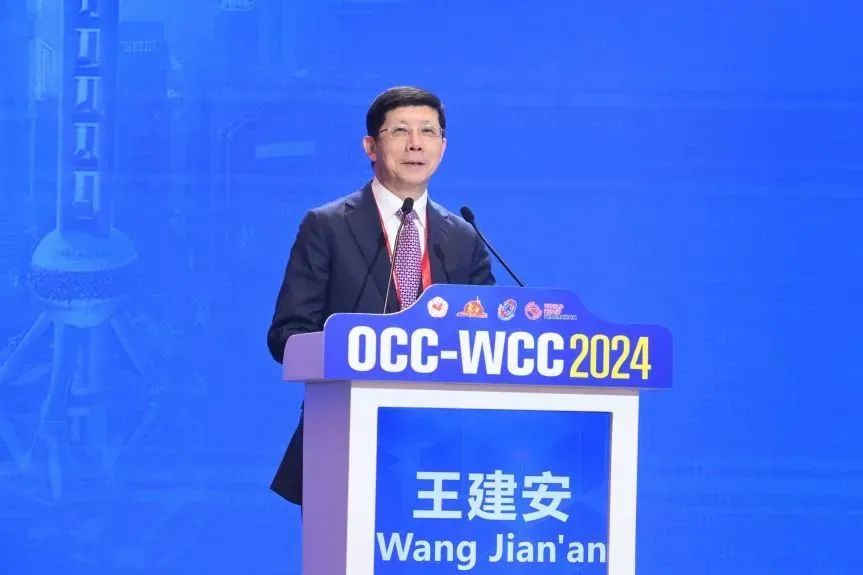
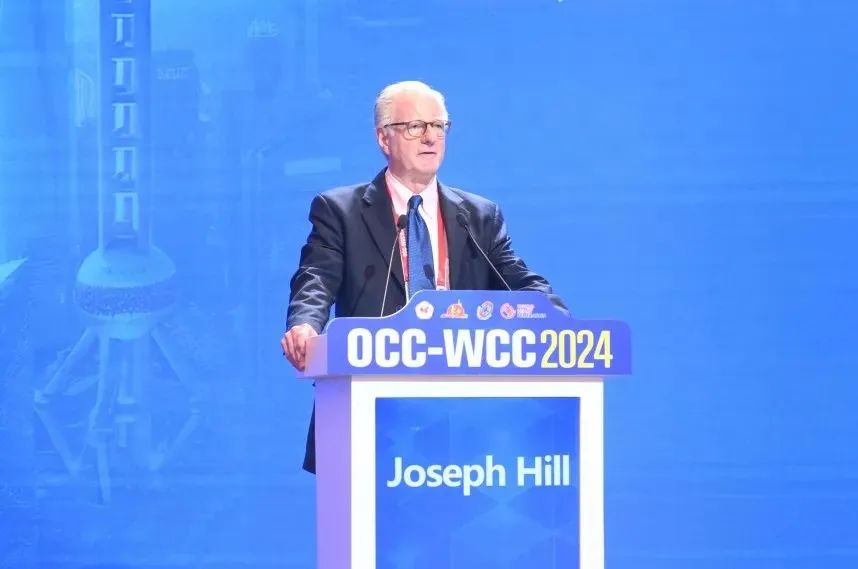
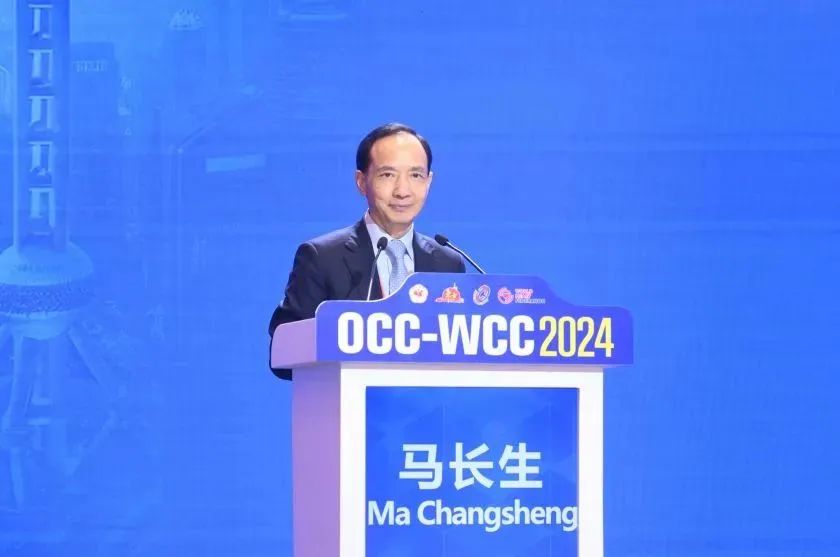
在主题演讲环节,韩雅玲院士分享了冠心病抗血小板治疗的升阶与降阶,指导临床医师做出正确决策;Jagat Narula教授演讲题目为《战胜冠状动脉灾难:将重点转移到社区》,强调了社区在心血管疾病管理中的重要作用;陈义汉院士介绍了心电控制系统的传统理论与新发现,揭示了除了经典电控系统外心脏中存在的更加庞大广泛的电控系统;王建安院士深入阐述了三尖瓣介入治疗研究进展,新器械、新技术、新方案的出现为三尖瓣介入治疗带来了新面貌;Joseph Hill教授从整体出发,聚焦心脏病学面临的挑战,探讨可能存在机遇,探索未来发展的方向;马长生教授系统讲述了心房颤动治疗的争议,如筛查、指南与临床之间的差异等,同时分享了当前房颤领域的最新研究进展。

OCC-WCC 2024 | What we see today, what we can do tomorrow - global cardiology giants gather in Shanghai to unfold the future of heart health
"From the moment humans look up at the starry sky, they are not far from unlocking the mysteries of the universe." Liu Cixin wrote in "The Three-Body".
Every step forward for humans starts with imagination and exploration. Therefore, from the moment medical scientists set their sights on the starry sky of the metaverse, the vision of realizing the medical metaverse is no longer out of reach.
8:00 a.m. on June 28, 2024 , cardiology giants from all over the world gathered at the Shanghai International Convention Center to witness the opening of the 18th Oriental Congress of Cardiology(OCC 2024) and the World Congress of Cardiology (WCC 2024) .
01 Opening Prologue: What we see today, what we can do tomorrow
Professor Ge Junbo first pointed out that the incidence and mortality of cardiovascular diseases in China are still on the rise. From a global perspective, the prevention and control of cardiovascular diseases is still severe. Perhaps we should break through the boundaries of disciplines and re-examine cardiovascular diseases and atherosclerosis from a higher level. Clinically, many patients often have cerebrovascular diseases and peripheral vascular diseases, which manifest as systemic atherosclerosis in addition to cardiovascular disease. Based on clinical observations, Professor Ge Junbo, together with Professor Wang Yongjun and others, proposed the concept of panvascular disease in China in 2015, hoping to prevent, treat and manage such diseases as a whole. It take a part for the whole if physicians only start from a single specialist perspective. And there will be deviations in the understanding of atherosclerosis or panvascular disease.
Panvascular diseases affect the whole body. If more effective intervention and management are to be carried out, a more efficient and accurate platform is needed to connect patients and doctors. The framework of artificial intelligence plus metaverse can undoubtedly meet this need. Professor Ge Junbo vividly demonstrated a real case. The AI model showed a high prediction value as its probability of hypertrophic cardiomyopathy was as high as 0.95, and subsequent examinations also verified this conclusion. Regarding the application of such models, Professor Ge Junbo invited Professor Thomas Gaziano, Chairman of the World Heart Federation Scientific Committee and OCC-WCC Academic Chairman , and Professor Christopher Kramer, Vice Chairman of the American College of Cardiology, to share their views.
Thomas Gaziano believes that the Metaverse can allow excellent doctors to serve more patients. In the Metaverse, the concept of mutual "connection" brings together strength. The tie he wore today was a gift just given to him by the China Cardiovascular Association(CCA). The English word "tie" also means "connection". It is this mutual connection and cooperation that allows us to face and solve current problems.
Christopher Kramer pointed out that hypertrophic cardiomyopathy is currently underdiagnosed. The emergence of AI technology has undoubtedly greatly improved the diagnostic efficiency and accuracy of hypertrophic cardiomyopathy, especially in cardiac imaging. Professor Christopher Kramer introduced a technology developed by his team that combines AI technology to identify cardiac scars without the need for MRI contrast agents, providing a new opportunity for the diagnosis of hypertrophic cardiomyopathy.
Professor Ge Junbo continued to wander in the Metaverse, introducing that the world's first photon CT was recently put into use in Ruijin Hospital affiliated to Shanghai Jiaotong University School of Medicine. It can not only measure the degree of coronary artery stenosis and evaluate the nature of coronary plaques, but also observe whether the plaques have inflammatory reactions, making a more accurate assessment of the lesions. Combined with the Metaverse, how will this technology change the way doctors diagnose and treat diseases?
Jagat Narula, the president elected of the World Heart Federation, said that the diagnosis of diseases and the management of patients need to be more sophisticated. If the metaverse can provide more detailed information, perhaps we can intervene in the lesions accurately, let patients know whether they can run or walk now, and what specific healthy foods to eat. The metaverse has great potential to help us achieve this goal.
Three weeks ago, Professor Ge Junbo used domestic interventional surgery robots and 5G technology to complete PCI interventional treatment for a patient 5,200 kilometers away. Faced with more complex interventional treatments for structural heart disease, can Metaverse continue to play an ideal role?
Eberhard Grube of the Center for Innovative Interventional Cardiology at the University Hospital of Bonn, Germany, recalled that he had an in-depth discussion with Professor Ge Junbo on interventional treatment of structural heart disease many years ago. At that time, there were very few cardiovascular physicians engaged in this field. Today, interventional treatment of structural heart disease has become a hot topic in the cardiovascular field. However, Professor Eberhard Grube pointed out a problem. Choosing interventional treatment means that the disease is not under control in the early stages. Perhaps the metaverse can bring about a change in the medical model. By conducting risk assessment and prompts early, we can truly prevent problems before they happen.
The basic concepts and related technologies of panvascular diseases and the Metaverse have been fully presented. The next step is for Professor Ge Junbo to show more practical application scenarios in the Metaverse in real time! A young female patient from Nanjing experienced palpitations and chest tightness. Based on the patient's symptoms and the parameters provided by the smart home, when AI comprehensively assessed that the patient needed medical treatment, Professor Ge Junbo took out the latest AR+VR head-mounted mixed reality device and entered the virtual clinic to diagnose the patient remotely. Professor Ge asked: Will the Metaverse bring fundamental changes to the medical model?
Dipti Itchhaporia, former president of the American College of Cardiology and director of the World Heart Federation, pointed out that although great progress has been made in the diagnosis and treatment of cardiovascular diseases and therapeutic drugs in the past 70 years, the way of providing care or patient management is almost the same as 70 years ago. The emergence of Metaverse enables us to provide high-quality care and management to more patients, and different methods and models can be adopted according to needs, and the accessibility to remote areas is also higher. Professor Dipti emphasized that this is not just a change in concept or mentality, but a subversive process. Today 's opening ceremony of OCC-WCC 2024 reflects this change. As Professor Ge Junbo proposed, the concept of panvascular disease is to regard the patient as a whole, and prevent, diagnose and manage the disease as a whole. Metaverse will undoubtedly gradually realize this vision. Professor Ge Junbo and five international cardiology experts jointly called for cardiovascular physicians to actively embrace the future, embrace the benefits brought by technology, and provide better treatment and management for patients.
02 Opening Remarks : Eighteen Years Passed in the Flick of a Fingertip
After the opening prologue, it was the enthusiastic opening ceremony. Guests attending the opening ceremony included: Professor Wu Jinglei, Vice Chairman of Shanghai Association for Science and Technology and President of Shanghai Medical Association; Honorary Chairman of the Conference, Professor Han Yaling, Academician of the Chinese Academy of Engineering, Chairman of the Chinese Society of Cardiology; Honorary Chairman of the Conference, Professor Zhang Yun, Academician of the Chinese Academy of Engineering, Vice Chairman of the Asia-Pacific Echocardiography Association; Honorary Chairman of the Conference, Professor Chen Yihan, Academician of the Chinese Academy of Sciences, Vice Chairman of the Shanghai Medical Association; Honorary Chairman of the Conference, Professor Wang Jianan, Academician of the Chinese Academy of Sciences, Vice Chairman of the Zhejiang Medical Association; Professor Tan Ming, Executive Vice Chairman of the Shanghai Medical Association; Chairman of the 9th Committee of the Chinese Society of Cardiology, Professor Huo Yong of Peking University First Hospital; Incoming Chairman of the Chinese Society of Cardiology, Professor Ma Changsheng of Beijing Anzhen Hospital Affiliated to Capital Medical University; and Chairman of the Conference, Professor Ge Junbo, Academician of the Chinese Academy of Sciences, Chairman of the Cardiovascular Physician Branch of the Chinese Medical Doctor Association, and Vice Chairman of the Shanghai Medical Association.
The OCC and WCC were held at the same time, and many overseas experts attended the opening ceremony, including Professor Daniel Piñeiro, current president of the World Heart Federation; Professor Jagat Narula, president-elect of the World Heart Federation; Professor Thomas Gaziano, chairman of the World Heart Federation Scientific Committee and academic chairman of OCC-WCC; Professor Dipti Itchhaporia, former president of the American College of Cardiology and director of the World Heart Federation; Professor Richard Chazai, former president of the American College of Cardiology; Professor Cathleen Dalton Biga, president of the American College of Cardiology; Professor Christopher Kramer, vice president of the American College of Cardiology; Professor Filippo Crea, editor-in-chief of the European Heart Journal; Professor Joseph Hill, editor-in-chief of Circulation; Professor Eberhard Grube, Center for Innovative Interventional Cardiology, University Hospital Bonn, Germany; Professor Lin Yanling, fellow of the Royal Australian College of Medicine and Singapore National Heart Center; and Professor Jiang Leng, founding president of the Chinese American Heart Association and non-invasive cardiology department of Massachusetts Medical Center. In addition, experts from more than 30 countries and regions, including members of the World Heart Federation Board of Directors and committees, members of international organizations and international societies/associations, standing committee members and members of the Chinese Society of Cardiology, and members of the Shanghai Medical Association's Cardiovascular Disease Branch, witnessed the wonderful opening moment together.
Friends from all over the world gathered together to open up a new journey for OCC
Professor Ge Junbo, on behalf of the organizing committee of the conference, delivered a welcome speech to all the friends who came from afar. Professor Ge first quoted Confucius' famous saying: "Isn't it a pleasure to have friends coming from afar?" The philosophical words of the ancient sages have come to today across 2,500 years. Even if they are expressed in English, the joy of gathering with fellow practitioners still resonates with the ancients. The 18 years of growth of the Oriental Association are also the 18 years of rapid development of Chinese cardiology. We are fortunate to be in such an era and have devoted ourselves to the cause of cardiovascular disease prevention and treatment, and have achieved many remarkable results. This year, OCC and WCC will be held at the same time. Under the concept of "open, creation and cooperative", OCC will contribute high-tech, high-efficiency and high-quality new quality productivity to the development of the discipline with global cardiovascular colleagues with a more open attitude, a more innovative pattern and broader cooperation opportunities, and make greater achievements for the heart health of China and even the world.
Professor Han Yaling delivered a speech on behalf of the Chinese Society of Cardiology. Professor Han Yaling pointed out that the prevalence of cardiovascular disease in China is still on the rise, and improving the level of cardiovascular disease prevention and treatment plays a very important role in building a healthy China. Under the careful organization of Professor Ge Junbo, the Oriental Congress of Cardiology fully discussed and exchanged new technologies, new concepts, new progress, and new equipment in a rich and diverse form. This year, OCC and WCC were held at the same time, which further enhanced academic exchanges at home and abroad. I believe that with the efforts of all cardiovascular disease experts, China's cardiovascular disease prevention and treatment will surely make greater progress.
Professor Daniel Piñeiro delivered a speech on behalf of the World Heart Federation. Professor Daniel pointed out that the World Heart Federation has united cardiovascular societies/associations in more than 120 countries and regions in the hope of uniting to improve health awareness, improve heart health, and reduce the burden of cardiovascular diseases. Cardiovascular diseases are closely related to all aspects of life. We must not only find out these connections and existing problems, but also actively look for solutions. This year's WCC and OCC are held at the same time, which is a model of successful cooperation. It is hoped that with the cooperation and efforts of all parts of the world, the goal of reducing the global burden of cardiovascular diseases by 1/3 by 2030 can be achieved.
Professor Wu Jinglei, on behalf of the Shanghai Medical Association, extended the warmest welcome to cardiovascular experts from all over the world who gathered in Shanghai. He said that in 2007, Professor Ge Junbo initiated the first OCC, which was also the opening work of the "Oriental" series of brand conferences of the Shanghai Medical Association. The 18-year development of the OCC has not only set a benchmark for the "Oriental" series of brand conferences, but also produced many representative original academic achievements. The prevention and control of cardiovascular diseases is still one of the challenges we are facing at present, and the majority of cardiovascular colleagues shoulder an important mission. It is hoped that the OCC will continue to deepen its interactive exchanges with the global academic community and jointly create a new high ground for the prevention and treatment of cardiovascular diseases.
03 Keynote Speech: New Progress and New Thinking
In the keynote speech session, Professor Han Yaling shared the escalation and de-escalation of antiplatelet therapy for coronary heart disease, guiding clinical physicians to make correct decisions; Professor Jagat Narula's speech was titled "Overcoming Coronary Artery Disasters: Shifting the Focus to the Community", emphasizing the important role of the community in the management of cardiovascular diseases; Professor Chen Yihan introduced the traditional theory and new discoveries of the electrocardiographic control system, revealing that in addition to the classical electrocardiographic control system, there is a larger and more comprehensive electrocardiographic control system in the heart; Professor Wang Jianan elaborated on the research progress of tricuspid valve interventional treatment, and the emergence of new devices, new technologies, and new solutions has brought a new look to tricuspid valve interventional treatment; Professor Joseph Hill started from the overall perspective, focusing on the challenges facing cardiology, discussing possible opportunities, and exploring future development directions; Professor Ma Changsheng systematically talked about the controversy in the treatment of atrial fibrillation, such as the differences between screening, guidelines and clinical practice, and shared the latest research progress in the current field of atrial fibrillation.

【大会微官网】
审核:梁春 钱菊英
